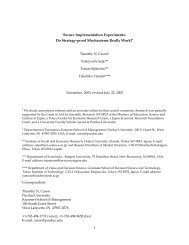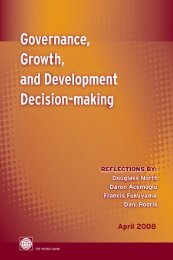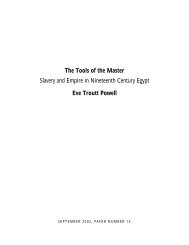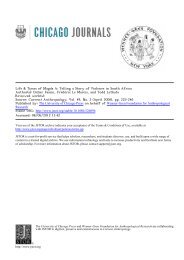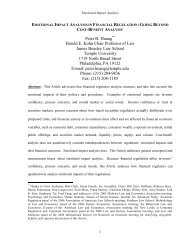Compassion and Repression: The Moral Economy of Immigration ...
Compassion and Repression: The Moral Economy of Immigration ...
Compassion and Repression: The Moral Economy of Immigration ...
You also want an ePaper? Increase the reach of your titles
YUMPU automatically turns print PDFs into web optimized ePapers that Google loves.
IMMIGRATION POLICIES IN FRANCE 371<br />
hospital, sometimes with a letter from the préfet requesting “diagnosis, treatment,<br />
<strong>and</strong> perspectives on prognosis” under cover <strong>of</strong> “medical confidentiality.” Often, on<br />
hearing the doctor say that “their disease is not severe enough to justify the claim,”<br />
they would express their disappointment or their anger. Sometimes, as in the case<br />
<strong>of</strong> the young Haitian woman, they would obtain not only medical approval but<br />
also free health care with the couverture maladie universelle, the social protection<br />
system for the poor. As one <strong>of</strong> the beneficiaries <strong>of</strong> this administrative decision once<br />
said to me: “It is the disease that is killing me that now keeps me alive” (Fassin<br />
2001c). He was from Nigeria <strong>and</strong> he had spent ten years in France <strong>and</strong> Germany<br />
without a legal permit. He had recently discovered that he had a severe form <strong>of</strong><br />
AIDS. After having lived for such a long time under the threat <strong>of</strong> being sent back<br />
to his country, he had finally received the residence permit under this new article<br />
<strong>of</strong> the law <strong>and</strong> was undergoing intensive antiretroviral therapy free <strong>of</strong> charge.<br />
No situation could reveal more obviously the recent change in European<br />
politics <strong>of</strong> life than this shift from political asylum to humanitarian reasons. For<br />
the French government <strong>and</strong> parliament, the legitimacy <strong>of</strong> the suffering body has<br />
become greater than that <strong>of</strong> the threatened body, <strong>and</strong> the right to life is being<br />
displaced from the political sphere to that <strong>of</strong> compassion. It is more acceptable <strong>and</strong><br />
less dangerous for the state to reject an asylum claim, declaring it unfounded, than<br />
to go against medical expertise recommending a legal permit for health reasons. On<br />
Tuesday, October 7, 2003, access to French territory was refused to a woman from<br />
Chechnya <strong>and</strong> her two young children who had asked for political asylum. Her<br />
husb<strong>and</strong> <strong>and</strong> father-in-law had been abducted by men with uniforms in Grozny; the<br />
former was never seen again <strong>and</strong> the dead body <strong>of</strong> the latter was discovered a few<br />
days later. When she started to search for her husb<strong>and</strong>, she received an anonymous<br />
letter threatening her <strong>and</strong> her children with death if she continued her inquiry.<br />
<strong>The</strong> French administrator <strong>of</strong> the Ministry <strong>of</strong> Foreign Affairs who met her at the<br />
Roissy airport, however, concluded that she could not show sufficient evidence <strong>of</strong><br />
exposure to threat, <strong>and</strong> thus a few hours later, before a lawyer could intervene in her<br />
defense, she was sent back to Moscow with her children (Fédération Internationale<br />
des Droits de l’Homme 2003).<br />
This is one <strong>of</strong> the many examples in which asylum seekers are denied entry<br />
even before they can file their cases. Meanwhile, state medical experts face an<br />
increasing task <strong>of</strong> ruling on the “humanitarian reasons” <strong>of</strong> claims, <strong>and</strong> immigration<br />
services are ordered to systematically “follow medical advice,” except in cases in<br />
which there is a “menace to public order.” It is much less politically risky for the<br />
government to deny entry to refugees than to expel a patient with AIDS or cancer.<br />
In Agamben’s (1997:9) terms, the full life (bios) <strong>of</strong> the freedom fighter or the<br />
victim <strong>of</strong> repression has less social value than the bare life (zoë) <strong>of</strong> the immigrant<br />
suffering from a severe disease. Many foreigners underst<strong>and</strong> in their “flesh,” to<br />
use Maurice Merleau-Ponty’s concept (1964), that their presence in France is not<br />
recognized for the political risks they have taken or the dangers they face but rather<br />
for the physical or psychic distress they can demonstrate. <strong>The</strong>ir access to French



